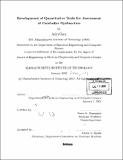Development of quantitative tools for assessment of cerebellar dysfunction
Author(s)
Garg, Aditi
DownloadFull printable version (5.300Mb)
Other Contributors
Massachusetts Institute of Technology. Dept. of Electrical Engineering and Computer Science.
Advisor
Steve G. Massaquoi.
Terms of use
Metadata
Show full item recordAbstract
Two tools for the quantitative assessment of cerebellar dysfunction are developed and explored. One is based on a battery of laptop tests desgined for clinical use. Extensive analysis of one of the tests using a speed/accuracy trade-off shows a correlation of 0.74 with existing scoring systems. The second involves modeling the cerebellar function in arm movement as a PID controller. Initial results show trends toward asymmetry, higher values for Gk₂₁ and Gk₂₂, and lower values for Gk₁₁ and Gk₁₂ as differences between the controller gains of ataxic subjects and control subjects when analyzing the trajectories of point to point movements. Further insight into these trends may lead to a deeper understanding of the cerebellum's function and dysfunction.
Description
Thesis (M. Eng.)--Massachusetts Institute of Technology, Dept. of Electrical Engineering and Computer Science, 2005. Includes bibliographical references (p. 55-56).
Date issued
2005Department
Massachusetts Institute of Technology. Department of Electrical Engineering and Computer SciencePublisher
Massachusetts Institute of Technology
Keywords
Electrical Engineering and Computer Science.